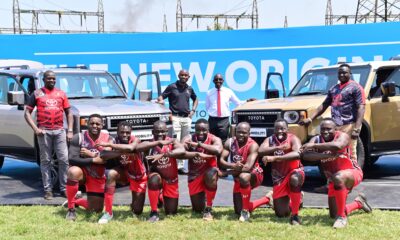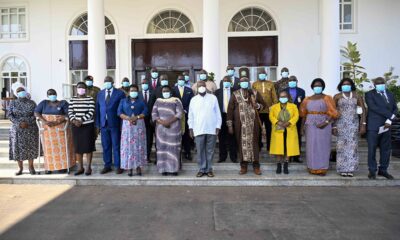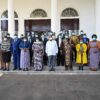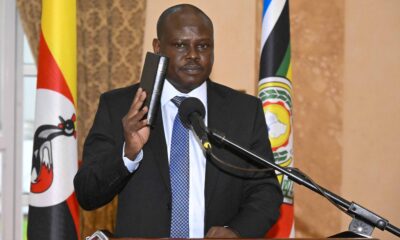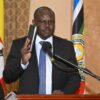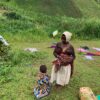News
President Yoweri Museveni’s Speech at Uganda’s 60th Independence Day Anniversary- Verbatim
Excellencies, Heads of State and heads of delegations from the brotherly countries of the EAC and from friendly countries, Their Excellencies the First Ladies, H.E. Vice President of Uganda, Rt. Hon. Speaker, His Lordship the Chief Justice, Rt. Hon Prime Minister, Hon. Ministers, Hon. Members of Parliament, the Rt. Hon. Secretary General of the NRM, Members of the Diplomatic Corps, Ladies and Gentlemen.
First of all, I thank their Excellencies the Heads of State for agreeing to come and share with us this joyous occasion in spite of their busy schedules. I also thank the brother countries that sent delegations. Secondly, I congratulate all Ugandans on this occasion of the 60thAnniversary of Uganda’s Independence. It has been quite an eventful 60 years.
Naye Abaganda tugamba nti: “Ekitatta Muhima tekimumarako nte” –“if a Muhima (a Munyankore) does not die, even if the cattle die, he will always get new cattle”. In spite of the numerous problems over these 60 years, Uganda is now standing and marching forward. It is not only Uganda that faced problems; so did many African countries.
That is why, on this occasion, I would like to ask the African political class two historical questions: “Are there Professors of Economics in Africa? Is the African Political Class determined to build a Latin America in Africa Instead of the United States of Africa in Africa?” Even by the time we defeated Idi Amin in 1979, our thinking on the philosophical, ideological and strategic issues, was well-crystalized. Philosophy tries to understand man and his motivations.
Ideology deals with ideas about the management of Society and strategy deals with the methods, used to implement whatever plans you have for society. On the side of philosophy, we had discovered that while there may be some ultruisticactors in Society, the majority of people were ego-centric. Hence, the wisdom of using the private sector in the economy, without banishing completely the use of parastatals. On the side of ideology, we discovered that in order to create prosperity for our people through the production and sale of goods and services, we need to emphasize the four principles of patriotism (loving Uganda), pan-Africanism (loving Africa), socio-economic transformation and democracy.
In order to use our understanding of philosophy and our ideology to create prosperity for our people, we evolved a strategy of 10 points programme. Point no. 5 of that programme, read as follows: “Building an independent, integrated and self-sustaining national economy”. By that time, we had already discovered that one of Africa’s problems, has been the curse of confining itself to the export of raw materials where we always get less than 10% of the actual value of the end product out of those raw materials and the resultant loss of jobs to the cleverer-led outsiders.
The external parasite groups are always interested in perpetuating that haemorrhage of resources and development energies from Africa to other places. What is most infuriating, however, are the comprador bourgeoisie (agents of foreign interests) in Africa, who do two things. First of all, they oppose our value addition efforts, so as to frustrate our industrialization efforts. Secondly, they are always importing everything from outside, including trivialities like dead people’s hair. It is these processes, that have stunted Africa’s growth.
It is a scandal if there were people to recognize real scandals. The global value for trade in coffee is US$460billion. The coffee-growing Countries get only US$25billion and Africa gets US$2.5billionUganda taking US$800 million. The global automobile business is US$2.86 trillion; Africa’s share is30.44billion. The global pharmaceutical business is US$1.42 trillion; Africa’s share isUS$16 billion. The global business for furniture is US$654.20billion; Africa’s share is US$4.86billion. The global business for textiles is US$1trillion; Africa’s share is US$31billion. The global business for cereals is US$1,337billion; Africa’s share is US$275.80 billion. The global business for milk is US$308.8billion; Africa’s share is US$18.06billion. The global business for fruits is US$622.80billion; Africa’s share is US$56.30billion. The global business for electronics is US$1,062billion; Africa’s share is US$82.16billion. The global business for electrical equipment isUS$1,540.25billion; Africa’s share is US$120billion.
The global business for beef is US$414.98billion; Africa’s share is US$333.90million. The global business for fish is US$544.20billion; Africa’s share is US$46.87billion.It is this, that prompts me to ask the Question: “Are there professors of economics in Africa?” Of course, it should be the political leaders that should evolve policies about these issues. The question, however, is: “If the political actors do not see this haemorrhage, why should the academicians not see it? Are they not supposed to scan the global system as to what is going on where and why?” Are professors and academicians, not supposed to use their knowledge to see what is good or bad for their people? It is a tragedy.
Here, in Uganda, we have had to fight the neo-colonial politicians, civil servants, and parasitic importing merchants, on account of this haemorrhage. Through struggle, we have caused vertical integration in some sectors outlined here below: (1)Maize -to produce maize flour (akahuunga); animal feeds, and we are targeting starch and ethanol. (2)Milk-processed liquid milk, ghee, butter, powdered milk, casein proteins, cheese, and yoghurt. (3) Cotton textiles, vegetable oil, animal feeds, and gun-powder being planned.The African market is flooded by dead people’s clothes (emichwijuro) from the USA and Europe known as second-hand clothes-thereby exporting money and jobs. (4)Sugar cane (ebikoijo)-raw sugar, industrial sugar, ethanol, rum, animal feeds, electricity.
(5)Cattle -beef, leather (recently). (6)Fish-Fish fillet (there are 14 factories operating now); Nile Perch maw is being developed as a big export earner. (7)Bananas-banana flour; banana starch; banana juice (Eshaande–Omubisi); banana wine; banana gin (waragi); alcohol sanitisers (anti-corona); -big war with the political class and the bureaucrats over this banana project; bananas good for potassium and carbohydrates; apart from vitamin C in ripe bananas (amenvu). (8)Fruits -fresh fruit exports; fruit juice (Teju); fruit pulp; later jam. (9)Sorghum -beer brewing. (10)Pines -ceiling boards; furniture; until recently, furniture for Uganda, including Government departments was being imported from China, India, Dubai etc.; imagine that!! (11)Gold-Gold refinery–(for electronics, jewellery, etc.) (12)Limestone-Cement; cement blocks; pavers. (13)Scrap metal-steel bars (emitayimbwa); steel gate doors. (14)Used car batteries-Recycled batteries(15)Rubber-car and motorcycle tyres. (16)PVC -plastics; textiles; blankets. (17)Palm oil soap; cooking oil. (18)Sesame seeds (sim sim)-Cooking oil; soap manufacture. (19)Marble-marble tiles; sanitary ware. (20)Clay -Industrial ceramics. (21)Granite -pavers; building blocks.
(22)Tea -tea leaves processing (there are 31 factories). These achievements have been in spite of the stiff opposition we have been facing from the parasites and their foreign backers, such as the Monitor Newspaper. To take an example, this paper, on the 22nd of May 2022, said that: “Coffee deal stinks, but key culprit will not be punished”.In other words, Museveni is committing a crime by trying to add value to Ugandan Coffee. Since 1986, I have been trying to get investors to add value to our coffee.
On the 12thof November 1997, I wrote a letter to Hon. Mayanja Nkangi to complain about the lack of movement on the issue. Our farmers are paid an equivalent of US$70 cents per kg of low-grade coffee. The same kilogram, when roasted, ground into powder and packaged, it sells for US$12.9 in a Supermarket. This is slavery I cannot accept. How can it be that the Economics Professors of Africa, do not see this? How can it be that the Ministries of Finance of Africa, do not see this? On the 12thof November 1997, I wrote the following letter to Hon. Mayanja Nkangi, who was our Minister of Finance at that time.
21In spite of the missed opportunities in the East African Region and in spite of so many avoidable mistakes that were committed by different actors, Uganda, finally, stabilized and started, not only growing, but also,undergoing social-economic transformation, ever since 1986. The small independence enclave colonial economy of 1962 of the 3Cs and 3Ts, had by 1986, shrank by 25%. The 3Cs were: Coffee, Cotton and Copper; and the 3Ts were: tobacco, tea and tourism.
By 1986, all the 3Cs had disappeared,except coffee that was still limping on. All the 3Ts had disappeared,except tobacco which was still limping on.Having lost 24 years of the 60 years, the NRM, our Movement, had fortunately, had many years of clarifying our philosophical, ideological and strategy positions on almost all issues of society and economy.
We had already distilled our four principles of patriotism, Pan-Africanism, Social-economic transformation and democracy. To realize the four principles, we put forward the 10 points programme, out of which point no. 5 was the oneguiding us to build an integrated, Independent and self-sustaining national economy, that rejected the slave role of confining ourselves to producing raw-materials. The principle of patriotism struck a bloc at the politics of identity (sectarianism of religion and tribes) and 22pushed forward the politics of the legitimate interests of all sections of our People.
That is why, ever since 1989, the NRM always won all elections by absolute majority in both popular votes and the electoral colleges. In the 1962 Independence elections, no Party could win by absolute majority because they had fragmented the electorate into sectarian groups that could never attract broad support. Guided by our principle of Pan-Africanism, when we won power, we worked with Mzee Hassan Mwinyi, Mzee Benjamin Mkapa, Mzee Daniel Arap Moi, supported by Mwalimu Julius Nyerere who was still alive, to revive the EAC, which was re-inaugurated on the 30thof November, 1999.Guided by the same principles, we stood with the African brothers in South Africa, Namibia, South Sudan, Rwanda, Burundi, Somalia, etc.
It is this principle,that educates us not to aim at building a Latin America in Africa but build a United States of Africa in Africa –to ensure the prosperity of our people and the strategic security of Africa. Our belief in patriotism and Pan-Africanism,enabled us to build a strong national Army for the first time since the collapse of the Bachwezi Empire around the year 1500 AD. This is, partly, on account of the ideology of anti-sectarianism. We do not look at soldiers with sectarian lenses,but with soldiership and ideological lenses for patriotism. That is how we were able to build an Army that could go for so long and anywherefor either no pay or low pay.
This strong Army,has been always backed by a vast structure of popular support in the form of the RCs (diluted to LCs by the career politicians who came later).This peace architecture,hasenabled the economy to recover and thrive. By the end of the last financial year, the size of the economy was US$45billion, having grown from US$1.5billion in 1986. The economy had, therefore, expanded 30 times since 1986 and we had entered the lower end of the Middle-Incomestatus with a per capita GDP of US$1046. This was in spite of the population growing from 14million in 1986 to 43million now. We could have achieved more if it was not for the obstructions,we normally get from careerist politicians and administrators or neo-colonial agents.
One of the big mistakes, has been the refusal by the careerist political and administrative class,to transform the pre-capitalist traditional society into a food-secure and commercially active class with ekibaro(cura, aimar, otita –esaabu) –looking for the most remunerative enterprisescompared to the family land size and, generally, getting involved in the money economy by the whole society. This is in spite of the guidance we have been giving the Country ever since1995 when I made the Country wide tour,giving facts of what can be done after I had carried out the successful transformation in the cattle corridor. On account of this criminal negligence by the political and administrative classes, by 2013, the homesteads that were still in the subsistence sector were 68%, having been 96% in 1969. That is when I involved the Army in OWC.
The figures show that there has been a decline in the homesteads that still work for ekidda kyonka (tic me la keken –kufanyiya tumbo peke yake) -working only for the stomach.WiththeParish Development Model and the Emyooga, not forgetting the bigger Industrialization and modernization programme, we are sure to, finally, involve all the homesteads in the money economy with ekibaro (cura, aimar). We have sent money to the Parish SACCOs and to the Emyoogafunds at the constituency. This is going to unleash massive production of food, beverages, other raw-materials, that must be processed by factories. Moreover, the agriculture will now be firmly anchored on irrigation. Therefore, the erraticness of production in agriculture,is over.
This, in turn, means that damage to the water bodies must stop because we need the water for irrigation. Out of the 60 million acres of Uganda, 8,958,000 are covered by water bodies and wetlands and assuming we have forests covering 30% of the country, that would leave us 15.3million acres. If 10 million acres were used for intensive agriculture of the 4 acres model, thawould give us 2.5million small farms. In the Rwengaju area, our small scale farmers, using only one acre, are employing 15 people per farm. Using this conservative figure, the 2.5million small farms, would employ 37.5million People.
Assuming the other 5 million acres were for medium scale farming using farms of 100acres each, we should have 50,000 farms. These, in additionto the intensive agriculture activities of the small farms, would, use extensive agriculture, to produce maize, sugar-cane, cotton, tea, tobacco, etc., products that only make economic sense when they are produced on large scale. These would create their own jobs. All this is just in agriculture. How about industry (manufacturing)? How about services? How about ICT?The problem, therefore, is not jobs. The problem is the neo-colonial thinking that is always off the point and not able to understand the strong potential of Africa.
Now that we have solved the problem of electricity, we are moving full steam on all the opportunities of value addition in agro-processing (fruit processing, animal feeds from maize, cassava flour and starch, banana flour and starch, ethanol from different sources, etc.); paper from forest products; ceiling boards from forest products; vertically integrated steel industry; full processing of copper; fertilizer industry from our phosphates; the pathogenic economy of vaccines and pharmaceuticals and diagnostics and sanitizers; the knowledge industry of auto-mobiles and electronics; etc., etc.With our East African brothers and sisters, the sky is the limit.Recently,there was yet another manifestation of Imperialistic arrogance and hegemonism by elements in the European Union Parliament whereby they decreed from Brussels that the East African Crude Oil Pipeline should not be constructed,until those arrogant actors permit us to do so. Parasitic elements from that part of the World,have been causing problems for Africa and the World for the last 500 years.
It all started with 1453ADwhen the Turkish Ottomans captured Constantinople and blocked the land route for Europe to the East for trade in silk, spices, etc. The Europeans, led by Portugal, legitimately,started looking for an alternative Sea route to the East to outflank the blockade. Partly due to our internal weaknesses, caused by the bankrupt tribal chiefs, what started as a search for alternative route to the East, soon became a mega-slave trading phenomenon, colonialism, exploitation, looting and genocide in Africa, Asia and the Americas. By 1900, the whole of Africa had been colonized except for Ethiopia.
However, soon, the Africans and other colonized Peoples,re-organized and launched a massive anti-colonial movement in Africa, Asia, Latin America and the struggle for equal rights by the Black nation in the USA. The ANC was founded in South Africa in 1912. By 1994, the arrogant imperialists were defeated in South Africa. Earlier on, the colonized Peoples had achieved victories in Indonesia, India, Indo-China (Vietnam,Cambodia and Laos), Mozambique, Angola, Guinea-Bissau, Zimbabwe, Namibia, Kenya and the whole of Africa, either through armed struggle or through peaceful mass struggles.
1994, with the liberation of South Africa, should have marked the end of imperialist arrogance and meddling in the affairs of their former victims. However, some elements are incorrigible as you can see from this resolution. The patriotic forces in the World are, however, much stronger and the patriotic forces in Uganda are much stronger and very capable in all dimensions. The imperialists use the mistakes and weaknesses of Africa. Otherwise, Africa is invincible as was shown by the victories in Mozambique, Angola, Zimbabwe, etc. East Africans, therefore, should not worry that those arrogant People can stop the oil project in East Africa.
If any actor tries to delay our project, we shall decisivelydealwith that betrayal according to the relevant laws. We shall develop all the aspects of the project with willing partners. Initially, I was not interested in the pipeline. I was only interested in the refinery to produce petrol, diesel, aviation fuel, etc.,for the East African market. It is Total whoinsisted even when Uganda has to give away US$12.7 per barrel to use that Pipeline. In the end, we supported the pipeline because it contributes something modest to our Tanzanian sisters and brothers, who, under Mwalimu’s leadership, contributed so much to Africa, including Uganda, in the anti-colonialism effort.
Besides, the pipeline corridor, provided by the Tanzanian Government, will bring to us gas from Tanzania and Mozambique because our gas resources are not that big. We need gas for fertilizer manufacture,to produce chemicals, etc. Therefore, down with the imperialist, parasitic meddlers. However, Africa should know that even during the anti-colonial struggle, we had progressive Whites that were on our side. Lord Fenner Brockway, Sir Dingle Foot, Prof. George W. Shephard, etc., worked with Mzee Musaazi in our anti-colonial struggle. Even today, there are progressive forces in WesternEurope,who can work for the common good of humanity, who are not part of White Chauvinism. We shall seek themout. Most importantly,the oil project and other projects are unstoppable. The NRM has always had a correct philosophical, ideological and strategy grasp ofall issues.
Nothing can derail us.In spite of the good movement in the World to curb the emissions of greenhousegases and move away from oil as a fuel for cars, our oil will remain valuable. We shall still need the oil for textiles like the shirt I am putting on. It is 65% polyesterwhich is from oil. We need hydro-carbons for fertilizer (nitrogen), for plastics (pvc), for tar for our roads. As you saw, we are moving on the electric vehicles, electric piki pikis, using hydrogen for steel manufacture etc. However, our oil will remain useful for other non-polluting purposes. All living things have carbon in them. Carbon is not a problem. The problem has been the greed of foreigners who jump from this to that looking for money without careful and honest study.
Before the coming of foreigners, Africa was using solar energy, wind energy, etc.,for drying things, processing millet (okweera) and using carbon (charcoal) for okuheesha (blacksmithing),in a controlled way. With the more understanding of natural laws (science), if we do away with greed, all these products can be used safely and sustainably. When oil will no longer be needed for drivingcars, it will serve us longer for use for the other purposes.
I thank everybody. In particular, I thank their Excellencies:H.E. Evariste Ndayishimiye, President of Burundiand Chairman of the East African Community, H.E. Salva Kiir Mayardit, President of South Sudan,H.E. Hassan Sheikh MohamudPresident of the Republic of Somalia,H.E. Dr. William Samoei Ruto, President of the Republic of Kenya, H.E. Dr. Hussein Ali Mwinyi, President of Zanzibar and Chairman of Revolutionary Council, representing the President of the United Republic of Tanzania, His Excellency Lihau Ebua Jean Pierre, Vice Prime Minister and Minister of Public Service representing H.E. Felix Tshisekedi of the DemocraticRepublic of Congo, Hon. Prof. Manasseh Nshuti, Minister of State for East African Affairs of the Republic of Rwanda, Hon. Dr. Peter Mutuku Mathuki, Secretary General of the East African Community Affairs and Hon. Sadio Camara, Minister of Defence of the Republic of Mali, for honouring us by positively responding to my invitation to be with us on this occasion. This is part of undugu.
Thank you so much.
Yoweri K. Museveni
PRESIDENT










